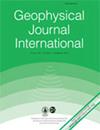Spatial Variation in Stress Orientation around Türkiye: Rupture Propagation across the Stress Regime Transition in the 2023 Mw 7.8 Türkiye Earthquake
IF 2.8
3区 地球科学
Q2 GEOCHEMISTRY & GEOPHYSICS
引用次数: 0
Abstract
Summary On 6 February 2023, an Mw 7.8 left-lateral strike-slip fault earthquake occurred on the East Anatolian Fault Zone (EAFZ) in Türkiye. This study examined the spatial variation of the stress field around Türkiye better to understand the generation process of this event. We first combined focal mechanisms around Türkiye, created a dataset consisting of 2984 focal mechanisms, and conducted stress tensor inversion. The results showed that the maximum compressional axis near the EAFZ was oriented north-south and slightly varied along the strike. Moreover, the relative magnitude of north-south compressional stress gradually increases from south to north, and the stress regime changes from a normal fault stress regime to a strike-slip fault regime. The stress change caused by the Mw 7.8 mainshock does not explain this lateral pattern, implying that this stress regime transition existed before the mainshock. This suggests that shear stress on the EAFZ was low in this southern segment because it was unfavourably oriented to the regional stress field. Previous studies have reported that the Mw 7.8 mainshock rupture started at a splay fault, first propagated through the central and northern segments and then backpropagated with a time delay toward the southern segment, where it caused a significant but relatively small slip. The preexisting along-strike shear stress variation on the fault may have contributed to the smaller and delayed coseismic slip in the southern segment than in the central and northern segments. Moreover, the mainshock rupture possibly caused stress rotation locally near the central segment where the magnitudes of the vertical and north-south compressional stresses were almost equal.图尔基耶周围应力方向的空间变化:2023 年 7.8 兆瓦图尔基耶地震中跨越应力区过渡的断裂传播
摘要 2023 年 2 月 6 日,土耳其东安纳托利亚断裂带(EAFZ)发生了 7.8 级左侧走向滑动断层地震。本研究考察了图尔基耶周围应力场的空间变化,以更好地了解这一事件的产生过程。我们首先合并了图尔基耶周围的病灶机制,创建了由 2984 个病灶机制组成的数据集,并进行了应力张量反演。结果表明,EAFZ 附近的最大压缩轴呈南北走向,并沿走向略有变化。此外,南北向压缩应力的相对大小由南向北逐渐增大,应力机制由正断层应力机制转变为走向滑动断层机制。7.8 级主震引起的应力变化并不能解释这种横向模式,这意味着这种应力机制的转变在主震之前就已经存在。这表明,EAFZ 南部地段的剪应力较低,因为它与区域应力场的方向不利。先前的研究报告指出,7.8 级主震的断裂始于一个倾斜断层,首先通过中部和北部地段传播,然后在一定时间延迟后向南部地段反向传播,在那里造成了巨大但相对较小的滑移。断层上预先存在的沿走向剪应力变化可能导致南段的同震滑动比中段和北段的小且延迟。此外,主震断裂还可能导致中段附近的局部应力旋转,在该处,垂直应力和南北向压缩应力的大小几乎相等。
本文章由计算机程序翻译,如有差异,请以英文原文为准。
求助全文
约1分钟内获得全文
求助全文
来源期刊

Geophysical Journal International
地学-地球化学与地球物理
CiteScore
5.40
自引率
10.70%
发文量
436
审稿时长
3.3 months
期刊介绍:
Geophysical Journal International publishes top quality research papers, express letters, invited review papers and book reviews on all aspects of theoretical, computational, applied and observational geophysics.
 求助内容:
求助内容: 应助结果提醒方式:
应助结果提醒方式:


